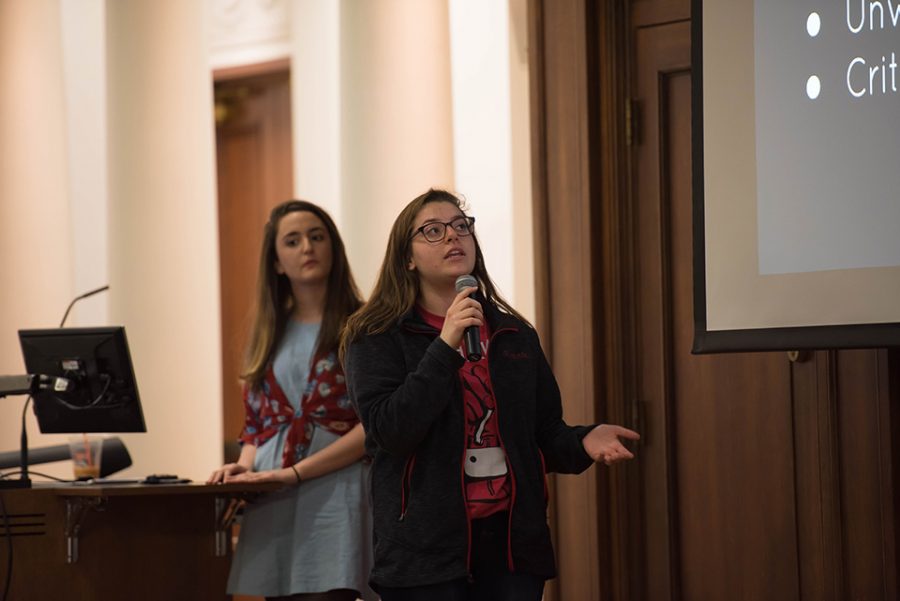Three divestment groups unite, criticize Board of Trustees
Christina Cilento, ASG president-elect and member of Fossil Free NU, speaks at an open forum hosted by the three divestment movements on campus — Fossil Free NU, NU Divest and Unshackle NU. The event focused on the Board of Trustees and its role overseeing NU’s investments.
April 13, 2016
Fossil Free Northwestern, Northwestern Divest and Unshackle NU hosted their first-ever joint event Tuesday night, discussing how they can reform the University’s investments as outlined in their three Associated Student Government resolutions.
The groups focused particularly on the Board of Trustees and its role overseeing how NU invests its endowment. Roughly 50 students attended the event, titled “Behind Closed Doors: The Stifling of Divestment Movements at NU.”
“The purpose of the event is to be transparent about all three divestment movements and our interactions with the Board and administration,” Weinberg senior Alexa Klein-Mayer, a member of NU Divest, told The Daily. “Transparency is something that we have been asking of NU and the Board.”
Fossil Free NU wants the University to divest from fossil fuel-related companies, NU Divest from corporations its members say violate Palestinian human rights, and Unshackle NU from companies that support the prison industrial complex.
Speakers analyzed the hierarchy of the Board, which has the final say as to what the University invests in. They described a 30-member investment committee, which meets four times a year to manage the University’s financial assets, as well as a 12-member investment subcommittee that meets once a month between the investment committee’s quarterly meetings.
Weinberg senior Laila Hayani, a member of Fossil Free NU, spoke to the Board’s lack of transparency and said in November 2014, the Investment Committee voted against divestment from fossil fuels, but it did not tell students until May 2015.
SESP junior Christina Cilento and McCormick junior Macs Vinson, ASG president-elect and vice president-elect respectively, also spoke at the event.
Cilento said Fossil Free NU’s five encounters with administrators and trustees have totaled to an hour and half of meeting time over the past three years. She also said a trustee told Fossil Free NU that, out of all student groups, it has had the most access to the Board in recent years.
“It’s been difficult for us because what we see as an incredible lack of accessibility they see as an incredible generosity,” Cilento said. “There’s a total disconnect there between the relationship that the trustees and students should have, which is why it becomes so difficult … to actually get into those meetings with them.”
Divestment leaders also spoke about “peer institutions” similar to NU and how they are addressing divestment. Columbia University, for example, has an advisory committee on socially responsible investing that makes recommendations to trustees, which they said comprises four alumni, four students and four faculty. The University of Chicago also has a student representative on the board, although leaders said the student’s involvement is time-limited.
NU announced in March plans to create a socially-responsible investment committee to advise University President Morton Schapiro and Chief Investment Officer Will McLean. That committee will include alumni, students, faculty and staff, Schapiro and McLean wrote in an email to divestment leaders last month.
But since then, students say they haven’t heard much from administrators, said Weinberg junior Ruba Assaf, a member of NU Divest. The three groups protested outside Schapiro’s Evanston home last Tuesday, waving signs on the sidewalk as ASG members had dinner with administrators inside. Some ASG members — including Cilento and Vinson — walked out of the dinner. Assaf said the groups held the protests after weeks of inaction from administrators.
Schapiro spoke about the divestment movements during a “community dialogue” at Norris University Center on Monday evening. He said there are no guarantees the Board will heed the students’ demands, but the Board might oblige if a “compelling case” is made. What won’t work, he said, are more protests, and he said he’s afraid demonstrations will have a “backfiring effect.”
“I personally have a belief that your investments should reflect your institutional values,” Schapiro said Monday. “If we have the right people, and we can make a strong enough case and we say this doesn’t make sense, I think maybe they’ll listen.”
The groups ended the event by discussing how they can collaborate to move toward their goals.
“The only way to get the power into the hands of our movements and the rest of the student body who cares about these issues…is to mobilize together,” said Medill junior Scott Brown, a Fossil Free NU member and former Daily staffer. “We have built three powerful movements, but they’re much more powerful if we come together.”
Email: [email protected]
Twitter: @fathma_rahman


